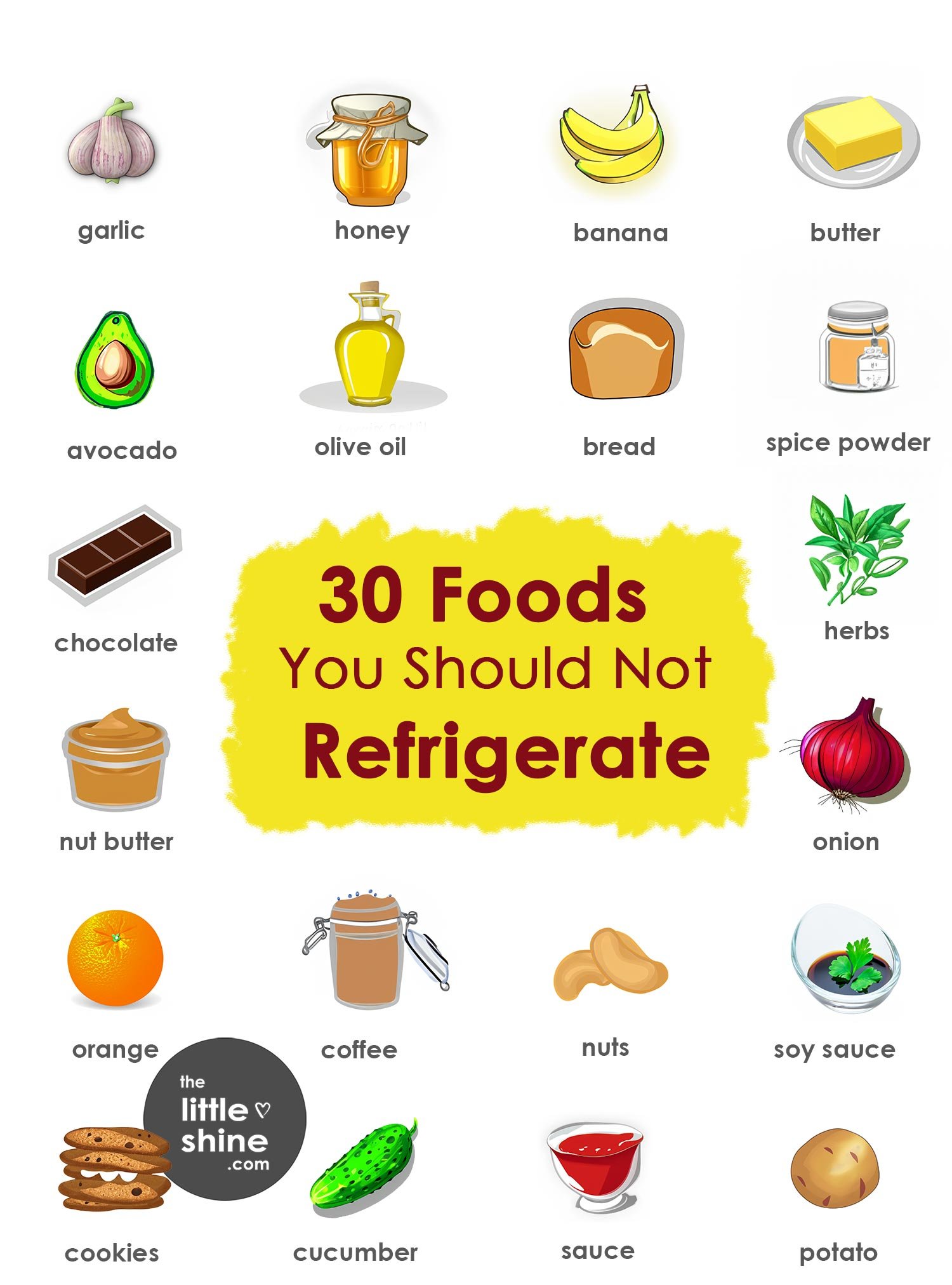Did you know there are certain foods that you cannot keep in the fridge? From avocados to bananas, butter, chocolates, and more, let me give you a list of 30 foods you should never keep in the fridge and why!

30 Foods You Should Never Store In the Fridge
1. Bananas
Bananas once kept in the fridge will not ripen, hastening the natural ripening process. Once ripened, it can be refrigerated.
2. Chocolates
Chocolates when kept in the fridge can hamper the taste, texture, and color of the chocolates.
3. Citrus Fruits
Citrus fruits when kept outside remain fresher and more juicier. Storing them in a cool and dry place is sufficient.
4. Dried Fruit
Dried fruit once put in the fridge can contain moisture and it can become soft and soggy, changing its taste and texture.
5. Avocados
Avocadoes, if unripe, should be kept outside to hasten its ripening process. Once ripened or cut, it can be refrigerated.
6. Fresh Herbs
Fresh herbs can be simply kept in a glass of water until use, instead of it being refrigerated. Refrigeration can make the leaves turn soggy and wilted.
7. Garlic
If garlic is kept in the fridge, it deteriorates quickly because of its added moisture (unless it is already peeled or prepared).
8. Butter
Butter can become hard once refrigerated, making it difficult to apply over bread. Butter is also often made with pasteurized milk, which makes it less prone to bacterial growth. The salt in your butter also wards off bacteria growth—but, if you have unsalted butter, it’s best kept in the fridge. You can keep a small quantity of butter on the countertop as much as you can use for 1-2 weeks.
9. Chocolate Spread
Chocolate spread can become hard once refrigerated, making it difficult to apply over bread. Also, the oils separate once kept in the fridge.
10. Honey
Honey if kept in the refrigerator can crystallize and solidify and it can change the taste and texture.
11. Jam
Jam, if unopened or store-bought can be kept outside until it is opened.
12. Hot Sauce
Hot sauce contains vinegar and doesn’t get spoilt even if kept outside.
13. Cucumber
For optimal preservation of cucumbers, avoid storing them in the fridge as this may cause them to become watery and develop pits.
14. Mangoes
Mangoes, if unripe, should be kept outside to hasten its ripening process. Once ripened or cut, it can be refrigerated.
15. Pastries
Pastries are best kept at room temperature as refrigeration can change its taste and texture.
16. Olive Oil
Olive oil can become grainy and cloudy if kept in the fridge and could also solidify in some cases.
17. Onions
Onions contain starch and when refrigerated, they can become soggy and damp.
18. Pears
Pears should be kept at room temperature to help them in their ripening process.
19. Pickled Vegetables
Pickled vegetables (if store-bought)contain preservatives, brine, and salt that can make them last long outside without spoiling.
20. Potatoes
Potatoes if refrigerated turn starch into sugar and can make it tasteless and can cause a change in its color.
21. Pineapple
Pineapples are best kept outside to help hasten the ripening process. Once cut, you can store it in the refrigerator.
22. Soy Sauce
Soy sauce contains high levels of salt and it can safely be kept outside the fridge without spoiling.
23. Sweet Potatoes
Sweet potatoes if kept in the fridge can alter it’s flavor and texture, due to a change in its chemical composition upon refrigeration.
24. Tomatoes
If tomatoes are kept in the fridge, the outer membrane gets watery and can dampen its flavour.
25. Tomato Ketchup
Tomato ketchup has a high content of salt, sugar, and vinegar and thus can be safely kept outside the fridge without it getting spoilt.
26. Pumpkin
Pumpkins should be kept outside as it toughens their skins and keeps them fresher longer.
27. Bread
Bread can be kept outside for a few days, even if not consumed. Refrigerating bread can make it hard and change its taste and texture.
28. Spice Powders
If spice powders are kept in the fridge, it will simply cause unwanted condensation and could minimize shelf-life and change the taste.
29. Peanut Butter
Peanut butter can become hard once refrigerated, making it difficult to apply over bread. Also, the oils separate once kept in the fridge.
30. Coffee
Coffee fares best in an airtight container. Refrigeration condenses coffee and reduces the flavor.